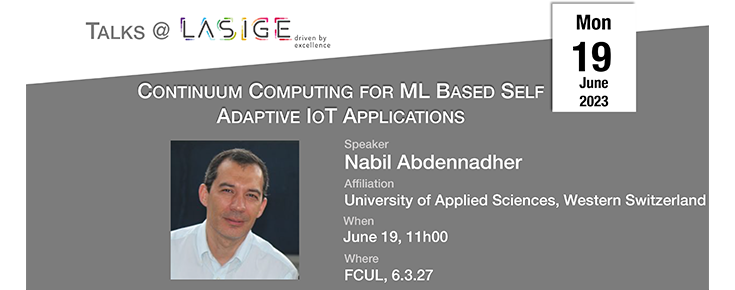
Por Nabil Abdennadher (University of Applied Sciences, Western Switzerland).
The proliferation of sensing device technologies, and the growing demand for data-intensive IoT applications, are paving the way to the next wave of transformation in IoT computing systems architecture. The goal today is to design, implement and deploy a seamless interconnection of IoT, edge and cloud resources in one computing system, to form a compute continuum, also referred to as edge-to-cloud or fog-to-cloud.
In this presentation, compute continuum refers to the deployment and execution of self-adaptive machine learning-based applications employing IoT sensors. Because of their distributed nature over constrained resources devices, these applications leverage the cloud infrastructure for learning tasks while exploiting edge devices for inference tasks on data coming from local IoT sensors. This presentation will be organised as follow:
- Why continuum computing?
- A comparative study of continuum computing solutions
- An example of a ML based IoT application deployed on an open-source continuum computing solution.
Bio: Nabil Abdennadher received the Diploma in Engineering (Computer science) from Ecole Nationale des Sciences de l’Informatique (ENSI, Tunisia), and the Ph.D. degrees in Computer Science from University of Valenciennes (France) in 1988 and 1991, respectively. He was an assistant professor at the University of Tunis II from 1992 to 1998 and a research assistant at the Swiss Federal Institute of Technology (EPFL) from 1999 to 2000. In 2001, he joined the University of Applied Sciences, Western Switzerland (HES-SO, HEPIA) as an assistant professor. In 2008, he became an associate professor and in 2017 he was promoted to full professor.
Nabil Abdennadher was head of the inIT research institute at HEPIA from 2010 to 2022. He is currently head of the LSDS research group, representative of the DataBooster initiative in Swiss Romandie and member of the Editorial Board of the Journal of Reliable Intelligent Environments. Nabil Abdennadher is currently working on several Swiss and European projects aiming at developing self-adaptive edge-to-cloud digital platforms applied to smart grid and smart city.






